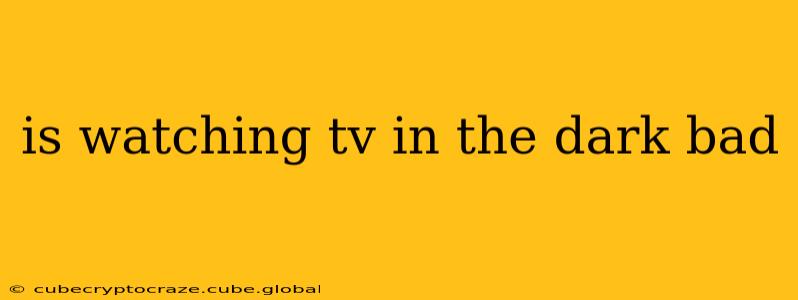Is Watching TV in the Dark Bad for Your Eyes? A Comprehensive Guide
Watching TV in the dark is a common habit, but is it actually harmful? The short answer is: it depends. While it's not likely to cause permanent damage, there are several potential downsides to consider. This comprehensive guide will delve into the effects of watching TV in the dark, addressing common concerns and providing practical advice.
What are the potential problems with watching TV in the dark?
This is a key question many people ask. The primary concern revolves around eye strain and fatigue. When you watch TV in a dark room, your pupils dilate to take in more light. This constant adjustment can lead to eye strain, headaches, and even blurry vision, especially after extended periods. Additionally, the contrast between the bright screen and the dark surroundings can exacerbate these issues. The bright light emitted from the screen can also contribute to eye dryness and irritation.
Can watching TV in the dark damage my eyesight permanently?
While prolonged exposure to bright screens in low-light conditions might lead to discomfort and temporary vision problems, there's no conclusive evidence suggesting permanent eye damage from this habit alone. However, pre-existing conditions like dry eye syndrome can be worsened. It's crucial to remember that eye health is complex, and many factors contribute to long-term vision problems.
Does watching TV in the dark affect my sleep?
This is a significant concern. The blue light emitted from screens, including televisions, can suppress melatonin production, a hormone crucial for regulating sleep. This disruption can lead to difficulty falling asleep, poor sleep quality, and ultimately, daytime fatigue. This effect is amplified in dark environments as your eyes are more sensitive to the blue light.
What are the best practices for watching TV?
To minimize potential negative effects, follow these guidelines:
- Adjust the brightness: Lower the screen brightness to a comfortable level, especially in low-light conditions.
- Increase the ambient light: Avoid complete darkness. Use a dim lamp or other soft lighting to reduce the contrast between the screen and your surroundings.
- Take breaks: Regularly look away from the screen to rest your eyes. The 20-20-20 rule (every 20 minutes, look at something 20 feet away for 20 seconds) is a helpful guideline.
- Maintain a proper viewing distance: Sit at an appropriate distance from the screen to minimize eye strain.
- Consider blue light filters: Many devices offer built-in blue light filters or night mode settings. These can reduce the amount of blue light emitted from the screen, potentially improving sleep quality.
Should I be concerned if I occasionally watch TV in the dark?
Occasional viewing in the dark is unlikely to cause significant harm. However, consistent, prolonged viewing in complete darkness is less advisable. The key is moderation and adopting good viewing habits.
My child watches TV in the dark. Should I be worried?
Children's eyes are still developing, making them potentially more susceptible to the negative effects of watching TV in the dark. It's especially important to enforce good viewing habits and ensure sufficient ambient lighting in their viewing space.
In conclusion, while watching TV in the dark isn't likely to cause permanent eye damage for most people, it can contribute to eye strain, sleep disturbances, and other discomfort. By following the recommended best practices, you can minimize these potential negative effects and ensure healthier viewing habits. Remember, consulting an ophthalmologist is always recommended if you experience persistent eye problems.
